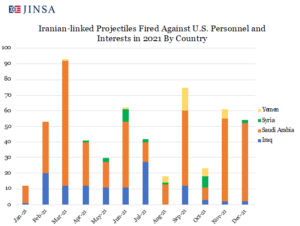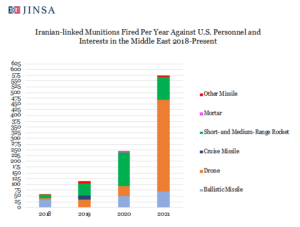Iran Summary – January 2022
About the Iran Summary: The Jewish Institute for National Security of America’s (JINSA) Gemunder Center produces a monthly tracker providing timely information and graphics illustrating Iran’s aggressive and destabilizing activities.
January 2022 Summary: Talks to revive the Joint Comprehensive Plan of Action (JCPOA) dragged into their eighth round, as Western officials continued to express, but not act on, their impatience, although three U.S. officials participating in the negotiations stepped back from the talks due to disagreements over the administration’s approach. Meanwhile, Iranian-backed groups significantly escalated their attacks in the new year, including Houthi militants launching multiple unprecedented strikes against the UAE.
Regional Aggression: Iran and its proxies significantly escalated their regional aggression campaign, including multiple attacks in Syria and Iraq to mark the anniversary of General Soleimani’s death, four unprecedented attacks on the UAE, and an attempt to kill the Iraqi Speaker of Parliament.
- Iranian-backed militias fired over eighty-five rockets, missiles, and drones in January 2022, compared to only thirteen during the first month of 2021, according to JINSA’s Iran Projectile Tracker. This continues an alarming trend in which Iranian-backed groups have launched over 620 munitions in 2021, including over 400 drones.
- Iranian-backed militias in Iraq and Syria launched several rocket and drone attacks in the days surrounding the January 3 anniversary of the U.S. strike that killed Iranian Quds Force Commander Qassem Soleimani two years ago.
- Counter Rocket, Artillery, and Mortar (C-RAM) and Coyote unmanned aircraft system (UAS) intercepted most of the incoming projectiles. U.S. forces took preemptive and retaliatory action against militias in Syria.
- S. forces took preemptive and retaliatory action against militias in Syria. U.S. forces also took preemptive and retaliatory artillery fire after militias targeted the U.S. Green Village base in Syria.
- On January 17, the Iran-backed Houthi militants launched Operation Hurricane Yemen, a major escalation of its missile and drone attacks in the Gulf, in which they launched at least five ballistic and cruise missiles and several Samad-3 drones.
- The Iran-backed Houthi militants fired two ballistic missiles at the UAE on January 24, which Emirate air defenses intercepted over the skies of Abu Dhabi. American-operated Patriot missile batteries in the UAE also responded to the attack. The reported target of the attack was the Al Dhafra Air Base near Abu Dhabi, which hosts the U.S. Air Force’s 380th Air Expeditionary Wing and hosts about 2,000 U.S. military and civilian personal.
- On January 25, Kata’ib Hezbollah launched three Katyusha rockets at the home of Iraqi Speaker of Parliament Mohammed al Halbousi, wounding two children outside the compound.
- The UAE intercepted a Houthi-launched ballistic missile while the UAE hosted Israeli President Yitzhak Herzog on January 31 during the first-ever visit of an Israeli president to the UAE.
 |
 |
|---|
Nuclear: Despite the commencement of the eighth round of the JCPOA negotiations on December 27, Iran continued to stand by its hardline position, while U.S. and European negotiators spent January repeating that the window for reaching an agreement will close within “weeks,” especially as Iran-held U.S. hostage have emerged as a stumbling block for the negotiations. Biden administration and European officials have claimed for months that time was running out on the nuclear talks, despite negotiations in Vienna continuing. A recent JINSA National Security Brief documents a timeline of these claims.
- On January 19, Iranian President Ebrahim Raisi met with Russian President Vladimir Putin. The two reportedly discussed Russia building new atomic reactors at Iran’s Bushehr nuclear plant.
- U.S. Secretary of State Antony acknowledged on January 23 that Iran’s nuclear breakout time had reached “a matter of weeks.”
- In late January, it was reported that Richard Nephew, the State Department’s Deputy Special Envoy for Iran, and two other identified members of the U.S. JCPOA negotiating team have stepped back from the negotiations after being rebuffed in their push for a tougher approach, including on the enforcement of preexisting sanctions and threatening to break off negotiations over Iran’s continued nuclear advancements.
- On January 23, U.S. Special Iran Envoy Rob Malley said that the United States is unlikely to reach an agreement with Iran while it still holds four U.S. citizens hostage.
- U.S. National Security Advisor Jake Sullivan stated on January 26 that the United States is preparing alternative options to prevent Iran from acquiring nuclear weapons, without providing specifics.
- Malley said on January 31 that “we only have a handful of weeks left to get a deal, after which point it will unfortunately be no longer possible to return to the JCPOA and to recapture the nonproliferation benefits that the deal provided for us.”
Cyber: Iranian cyberattacks against Israel continue. At the same time, amid increasing concern that Iran will turn its attention toward Western targets, the United States officially recognized the MuddyWater hacking espionage group as an Iranian-backed entity.
- Two Israeli news outlets, the Jerusalem Post website and the Maariv Twitter account, were hacked on January 3 to display an Iranian propaganda video of a missile hitting the Israeli Dimona nuclear site in commemoration of the anniversary of the assassination of Iranian General Qassem Soleimani. The rhetoric of attacking Dimona constituted an escalation from usual Iranian threats.
- On January 12, the U.S. Cyber Command formally attributed the activities of the hacker group known as MuddyWater to Iran’s intelligence agencies.
Domestic/Human Rights: In the new year, Iran continues to purge dissent against its autocratic policies and economic mismanagement, including the arbitrary imprisonment of human rights activists and foreign nationals. Additionally, the regime has continued its use of violence to control its citizens, from state-sanctioned execution of minors and notable Iranian athletes to systemic extrajudicial killings in non-Persian areas.
- Dissident Iranian poet and filmmaker Baktash Abtin died on January 8 after catching COVID-19 while serving a six-year prison term for “illegal assembly and collusion against national security” and “spreading propaganda against the state.
- On January 13, a group of UN-appointed human rights experts called on Iran to halt the execution of Hossen Shahbazi, a young man who was arrested for murder in 2018, when he was seventeen years old. The experts emphasized the fact that Shahbazi was reportedly tortured for eleven days and denied access to a lawyer before confessing.
- The Iranian regime sentenced Iranian boxing champion Mohammad Javad to death on January 15 for his participation in November 2019 protests against regime corruption. The official charge was “spreading corruption on earth,” which is frequently employed by the regime to purge protestors and dissidents.
- On January 19, police in the northwestern Iranian Azeri-majority city of Zanjan opened fire on a civilian car, killing an eight-year-old girl and critically wounding her teen sister.
- Prominent Iranian human rights activist Narges Mohammadi was sentenced on January 23 to eight years in prison and seventy lashes in a trial that lasted only five minutes. Mohammadi, who stands accused of “spying for Saudi Arabia” was initially arrested in November after she attended a memorial for a victim of the November 2019 protests. She has been barred from outside contact and denied access to a lawyer.
- French national Benjamin Briere was sentenced on January 25 by an Iranian court to eight years in prison on espionage charges. Briere is currently on a hunger strike, and his Paris-based lawyer claims that the trial was politically motivated and that Briere is being used as a “bargaining chip.”
Recent JINSA Publications on Iran:
-
- January 19, 2022: A Stronger and Wider Peace: A U.S. Strategy for Advancing the Abraham Accords, JINSA Abraham Accords Policy Project
- January 19, 2022: “Why Has Biden Stopped Pushing for Arab-Israeli Peace?” John Hannah and Jonathan Ruhe, Foreign Policy
- January 20, 2022: “Iran’s Drone Offensive,” Ari Cicurel, JINSA NatSec Brief
- February 1, 2022: “Time Never Seems to Run Out for Iran Negotiations,” Jonathan Ruhe, Andrew Ghalili, and Sam Millner, JINSA NatSec Brief